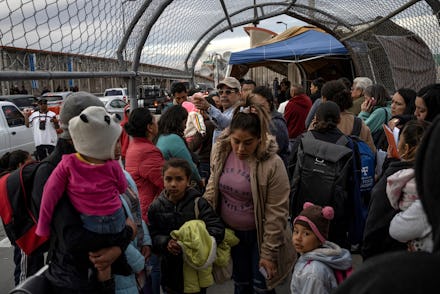Trump's immigration rule puts migrants at risk for kidnapping, says government lawyer

The same day that the Supreme Court gave the Trump administration the green light to move ahead with one of its most destructive anti-immigration policy initiatives, newly obtained audio suggests the White House knowingly pushed the program while knowing full well the dangers it presented to migrants hoping to enter the United States. Less than one month after the 9th Circuit Court of Appeals in San Francisco halted the administration's "Remain in Mexico" policy, also known as Migrant Protection Protocols, which forces migrants claiming asylum in the U.S. to await their court hearings on the Mexican side of the border, the Supreme Court has ruled the policy may in fact stay in place while ongoing challenges work their way through the legal system.
Critics of the policy — part of the Trump administration's larger anti-immigrant stance — have long held that by forcing migrants to stay in Mexico, often in communities that lack the necessary resources to accommodate the mass influx of asylum seekers, the U.S. Government has put them at serious risk of rape, assault, and kidnapping. And as it happens, lawyers for the Trump administration secretly agree.
In audio obtained by CNN on Wednesday, a Justice Department attorney admitted that by forcing migrants to stay in Mexico while they await court hearings to determine their asylum claims, the U.S. government was indeed putting those people at risk of kidnapping.
CNN interviewed two cousins seeking asylum in the U.S. who had come from Venezuela. They were detained at the border and sent to wait in Mexico for their asylum hearings. One of the cousins was kidnapped by cartels shortly after their arrival in Mexico, they told CNN, leaving the other one to attend the court hearing alone. In audio CNN obtained from that hearing in conjunction with Human Rights First, a lawyer from the Department of Homeland Security is heard arguing against granting the kidnapped cousin asylum because he was not present for his court hearing.
"The circumstances that they're concerned with is potentially a reality for every respondent," the lawyer says, with the fact of being kidnapped being the "circumstances" in question. "That opens up the floodgates because everybody doesn't have to show up as long as they have counsel," the lawyer continues. His argument is essentially this: If you grant someone who was kidnapped asylum, you might have to grant a lot of asylum, because kidnapping is a possibility for every migrant under the "Remain in Mexico" program.
The judge in the cousins' hearing described the lawyer's argument bluntly as "well, everybody has to take that risk and that chance, and [if] you get kidnapped, you get kidnapped." "I don't think it's humane," the judge added. "I really don't like what I just heard."
The Trump administration attorney's assessment of the MPP's dangers seems to fall squarely in line with the original ruling from the 9th Circuit's Judge W. Fletcher — who wrote the order to halt "Remain in Mexico." Fletcher in his opinion wrote that that:
There is a significant likelihood that the individual plaintiffs will suffer irreparable harm if the MPP is not enjoined; uncontested evidence in the record establishes that non-Mexicans returned to Mexico under the MPP risk substantial harm, even death, while they await adjudication of their applications for asylum.
Nevertheless, the Justice Department celebrated Wednesday's Supreme Court order to let the policy stay in place. "The Migrant Protection Protocols, implemented pursuant to express authority granted by Congress decades ago, have been critical to restoring the government's ability to manage the Southwest border and to work cooperatively with the Mexican government to address illegal immigration," a spokesperson for the department told CNN.